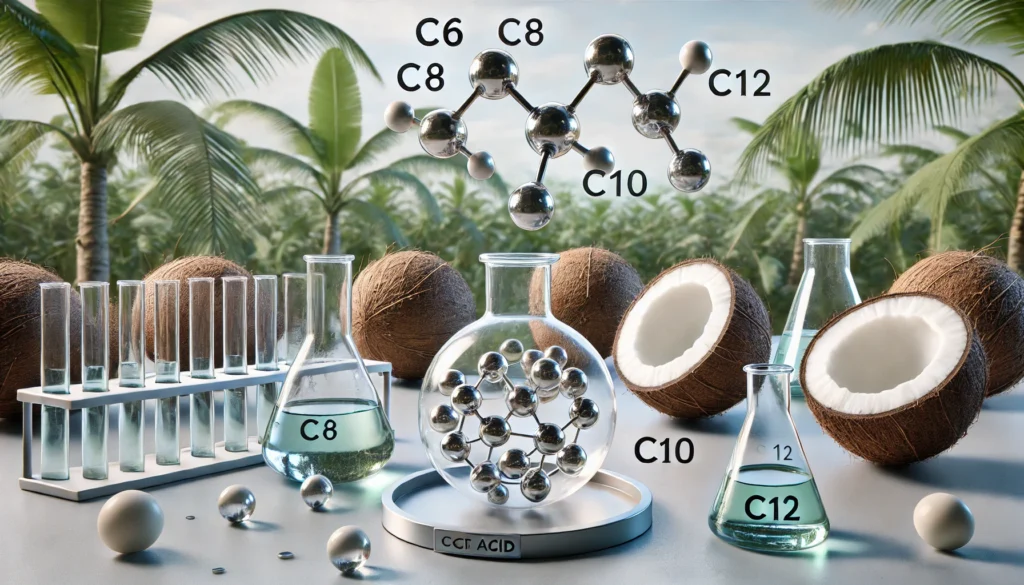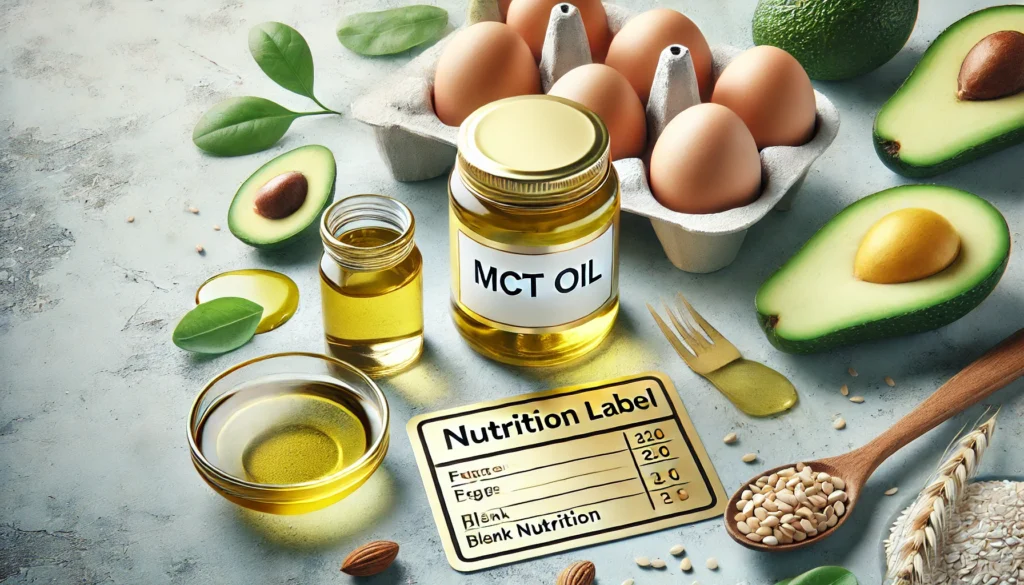Introduction
In the world of functional nutrition and bioactive dietary fats, Medium-Chain Triglyceride (MCT) oil stands out as a powerhouse. Once a niche supplement reserved for elite athletes and medical nutrition therapy, MCT oil has exploded into the mainstream due to its wide-ranging benefits for brain function, metabolism, energy production, and gut health. But for all its popularity, confusion remains about what MCT oil truly contains and how it functions differently from other dietary fats. Are all MCT oils created equal? What exactly are the mct oil ingredients listed on the bottle? And how does organic M C T oil compare to conventional versions in purity, bioavailability, and effectiveness?
You may also like: MCT Oil for Dementia and Brain Health: Exploring Its Role in Memory, Function, and Alzheimer’s Support
Consumers are also increasingly interested in specifics like mct oil nutrition facts, the actual mct oil calories per serving, and how these fats behave when used in everyday culinary applications. With the rise of keto and low-carb lifestyles, there’s also growing demand for clarity on using coconut mct oil for cooking. Understanding the science behind MCT oil—not just its effects but its composition—is key to making informed, health-enhancing choices.
This article takes a comprehensive dive into the molecular breakdown of MCT oil, the implications of sourcing and processing (especially in organic versions), and how the unique metabolic profile of these triglycerides supports various aspects of human health. Whether you’re a biohacker, nutritionist, chef, or wellness enthusiast, you’ll walk away with a science-backed understanding of what’s really inside your MCT oil bottle—and how to use it for maximum impact.

What Is MCT Oil Made Of?
At its core, MCT oil is a refined form of dietary fat composed primarily of medium-chain triglycerides—fats with a chain length of 6 to 12 carbon atoms. Unlike long-chain fats found in most other oils, MCTs are rapidly absorbed by the liver and converted into ketones, making them an efficient energy source for both the body and brain.
The most common mct oil ingredients include caprylic acid (C8), capric acid (C10), lauric acid (C12), and occasionally caproic acid (C6). Each of these fatty acids has its own biochemical characteristics:
Caprylic acid (C8) is highly ketogenic and quickly converted into energy, often prized in high-performance and clinical MCT formulations. Capric acid (C10) offers slightly slower absorption but still supports ketone production. Lauric acid (C12), while technically a medium-chain fat, behaves more like a long-chain triglyceride and is slower to metabolize. Caproic acid (C6) is less commonly used due to its strong taste and gastrointestinal irritation potential.
Premium MCT oils often highlight their C8 or C8/C10 ratios, while budget versions may include higher proportions of lauric acid or mixed fatty acids. Understanding which fatty acids dominate your MCT oil is essential for tailoring it to your specific health goals.

The Role and Benefits of Organic M C T Oil
As consumers become more discerning about what goes into their bodies, demand for organic M C T oil has surged. But what does “organic” mean in this context?
Organic M C T oil is derived from coconuts grown without synthetic fertilizers, pesticides, or genetically modified organisms (GMOs). The oil is typically extracted using natural processes such as cold-pressing or steam distillation, rather than chemical solvents like hexane. This not only ensures a cleaner final product but also helps preserve the integrity of the medium-chain fats.
There’s also an ethical and ecological advantage to choosing organic M C T oil. Coconut farms certified as organic often follow more sustainable practices, support biodiversity, and maintain fair labor standards. For health-conscious and environmentally aware consumers, these factors enhance the value of the oil beyond its nutritional properties.
Functionally, organic M C T oil performs similarly to conventional MCT oils, but with reduced risk of residual contaminants. In therapeutic contexts—such as cognitive support in neurodegenerative disease or metabolic regulation in diabetes—this purity becomes especially important. Whether blended into coffee, smoothies, or therapeutic elixirs, organic M C T oil delivers the same fast-acting, ketone-boosting benefits while offering an added layer of safety and ethical integrity.
A Deep Dive into MCT Oil Nutrition Facts
To understand how MCT oil fits into a nutrition plan, one must first look at the label. The standard mct oil nutrition facts panel typically reveals the following per one-tablespoon (15 mL) serving:
Calories: 120–130 Total Fat: 14 grams Saturated Fat: 13–14 grams Trans Fat: 0 grams Polyunsaturated Fat: 0 grams Monounsaturated Fat: 0 grams Cholesterol: 0 mg Carbohydrates, Fiber, Sugar: 0 grams Protein: 0 grams
These nutrition facts highlight MCT oil as a pure fat source with zero carbs and zero protein—ideal for ketogenic, carnivore, and low-carb diets. The saturated fat content, while high, is composed of medium-chain triglycerides, which metabolize differently than long-chain saturated fats like those found in butter or red meat.
This unique metabolic pathway allows MCTs to bypass the lymphatic system and go straight to the liver, where they are converted into ketones within minutes. This rapid absorption explains why mct oil calories are often considered “functional” rather than merely “storage” calories. Unlike excess calories from sugar or processed fats, MCT oil calories are more likely to be used immediately for energy, thermogenesis, or mental clarity.

Are MCT Oil Calories Different from Other Fats?
One of the most intriguing aspects of MCT oil calories is their thermogenic effect. Unlike traditional dietary fats that are stored in adipose tissue, MCTs are oxidized quickly for fuel. Several studies have shown that MCTs increase energy expenditure, promote fat oxidation, and may even suppress appetite—contributing to weight management and improved body composition.
This means that, calorie for calorie, MCT oil behaves very differently from vegetable oils, seed oils, or even long-chain saturated fats like tallow. It’s not just about the number of calories but how those calories are processed. In metabolic research, this is often described as the concept of “caloric efficiency.”
For athletes, busy professionals, or individuals with cognitive concerns, incorporating mct oil calories into the diet may offer strategic energy without the crash associated with glucose-based fuels. Whether taken straight, mixed into coffee, or blended into pre-workout shakes, MCT oil can provide a mental and physical boost without significant digestive burden.
Coconut MCT Oil for Cooking: Is It Safe and Effective?
As the popularity of MCT oil has grown, so too has its use in culinary settings. Coconut mct oil for cooking is often marketed as a high-heat, stable alternative to olive oil or butter. But is it really safe to cook with?
MCT oil has a smoke point of around 320°F (160°C), which is lower than avocado oil or ghee but comparable to extra virgin olive oil. This means it’s suitable for low to moderate-heat applications such as sautéing vegetables, making stir-fries, or scrambling eggs. However, it’s not ideal for deep-frying or grilling at high temperatures, as excessive heat can degrade the fatty acids and generate unwanted compounds.
From a nutritional standpoint, using coconut mct oil for cooking can add functional fat to meals without altering the flavor significantly. It integrates seamlessly into savory dishes, and its neutral taste makes it compatible with a wide range of cuisines.
That said, one must consider the form of MCT oil used. Emulsified or powdered versions are not designed for cooking and may degrade or clump when heated. Only pure liquid forms, ideally those with a high concentration of C8 and C10, are suitable for stovetop use. Always check the label and manufacturer’s guidelines before using MCT oil in hot preparations.

Choosing the Right MCT Oil Ingredients for Your Goals
Not all MCT oils are created with the same goal in mind. Some are tailored for weight loss, others for cognitive enhancement, and still others for digestive support. This means the mct oil ingredients list can vary significantly in quality and purpose.
High-performance MCT oils tend to emphasize caprylic acid (C8) due to its rapid conversion into ketones and minimal digestive upset. Others may include added emulsifiers, flavorings, or synergistic ingredients like L-theanine, turmeric, or DHA for enhanced effects.
Organic M C T oil products often prioritize purity over complexity. These tend to be simpler, cleaner, and more suitable for individuals with chemical sensitivities or those adhering to strict elimination diets.
In general, the fewer ingredients listed, the better. Look for oils that are 100% MCTs from coconut (not palm oil), free from fillers, binders, artificial flavors, or hydrogenated fats. If additional ingredients are included, they should have a clear, functional purpose—not just marketing fluff.
Understanding your own health goals will help you interpret mct oil nutrition facts and choose a formula that supports your intended outcomes, whether that’s mental clarity, fat loss, gut health, or exercise performance.
Frequently Asked Questions
1. What are the most important MCT oil ingredients to look for?
The key ingredients in a high-quality MCT oil are caprylic acid (C8) and capric acid (C10), as they are quickly metabolized into ketones and offer significant brain and metabolic benefits. Lauric acid (C12) is sometimes included, but it has slower absorption. For best results, choose a formula that lists the specific percentages of C8 and C10. Avoid products with palm-derived MCTs unless sustainability and ethical sourcing are verified.
2. How is organic M C T oil different from regular MCT oil?
Organic M C T oil is made from coconuts that are cultivated without synthetic chemicals, pesticides, or GMOs. The oil is extracted using clean, solvent-free methods that preserve nutritional integrity and avoid contamination. This results in a product that is purer, safer, and more eco-friendly. While the functional benefits are similar to regular MCT oil, the added assurance of purity and sustainable sourcing makes organic versions preferable for many consumers.
3. How do MCT oil nutrition facts support ketogenic diets?
MCT oil is a pure fat with zero carbs, making it ideal for ketogenic and low-carb eating. Its rapid conversion into ketones supports mental clarity and energy while keeping insulin levels low. The mct oil nutrition facts label reflects a product that is 100% fat—mostly saturated—and metabolically efficient. This aligns perfectly with the goals of ketosis, where fat becomes the body’s primary fuel source.
4. How many mct oil calories should I consume per day?
This depends on your goals, tolerance, and total daily fat intake. A typical dose is 1 to 2 tablespoons (120–240 calories) per day. For energy or mental focus, many people take 1 tablespoon in the morning. If you’re new to MCTs, start with 1 teaspoon and increase slowly to avoid digestive issues. MCT oil calories are efficiently burned and less likely to be stored as fat compared to other oils.
5. Can I use coconut MCT oil for cooking at high temperatures?
Coconut MCT oil can be used for low to moderate-heat cooking but should not be exposed to very high temperatures like deep-frying or broiling. Its smoke point is around 320°F. For safe and effective use, stick to sautéing, baking, or lightly simmering. Always ensure you are using pure liquid MCT oil, not emulsified or powdered forms, when cooking.
6. Is MCT oil suitable for vegetarians and vegans?
Yes, MCT oil is plant-derived—typically from coconuts—and is suitable for both vegetarians and vegans. Organic M C T oil especially aligns with clean eating principles, provided it is produced without animal-derived processing aids. Always check for third-party certifications if plant-based sourcing is a priority.
7. How can I verify the quality of MCT oil ingredients?
Check for transparency on the label. A high-quality product will specify the percentage of each MCT (C8, C10, C12), list the coconut source, and provide organic or non-GMO certifications. Look for third-party testing, solvent-free extraction, and absence of fillers or artificial ingredients. Trusted brands often disclose sourcing and manufacturing practices openly.
8. Are there any side effects of consuming MCT oil?
Some people experience digestive issues such as cramping, loose stools, or nausea—especially when starting at high doses. To minimize these effects, start with small amounts and increase gradually. Always use MCT oil with food or beverages rather than on an empty stomach. If symptoms persist, try switching to a high-C8 formula, which tends to be easier on the gut.
9. How does MCT oil compare to other healthy fats like olive or avocado oil?
MCT oil is more rapidly metabolized and has unique ketogenic properties that are not shared by olive or avocado oils. While the latter are rich in monounsaturated fats and antioxidants, MCT oil is specifically useful for cognitive support, energy, and ketosis. Each oil has its place: MCT oil for quick energy and brain fuel; olive and avocado oils for cardiovascular support and culinary versatility.
10. Can I mix MCT oil with protein shakes or smoothies?
Yes, MCT oil blends well into protein shakes, smoothies, and even coffee. Its neutral flavor and thin consistency make it easy to incorporate into various beverages. Just blend thoroughly to avoid separation. For added convenience, emulsified versions are available that mix even more smoothly, though they may contain additional ingredients.

Conclusion
MCT oil is far more than just a trendy supplement—it’s a scientifically validated functional fat with wide-ranging applications for brain health, metabolic support, digestive balance, and culinary enhancement. Understanding the mct oil ingredients list is the first step in harnessing its full potential, especially when tailoring intake to personal health goals.
Whether you’re seeking clean energy, cognitive clarity, or a dietary fat that aligns with keto principles, organic M C T oil offers a compelling option. Its high purity, ethical sourcing, and efficient metabolic profile set it apart from many other fats. Additionally, paying attention to mct oil nutrition facts and mct oil calories can help integrate it effectively into daily routines without disrupting caloric balance.
And if you’ve ever wondered whether coconut mct oil for cooking holds up in real-world kitchens—the answer is yes, within its smoke point limits. Choose wisely, dose carefully, and enjoy the benefits of a fat that truly feeds both body and mind.
Was this article helpful? Don’t let it stop with you. Share it right now with someone who needs to see it—whether it’s a friend, a colleague, or your whole network. And if staying ahead on this topic matters to you, subscribe to this publication for the most up-to-date information. You’ll get the latest insights delivered straight to you—no searching, no missing out.
Further Reading:
MCT Powder vs Oil: Which Is Better for Brain, Energy, and Gut Health?
MCT Powder vs MCT Oil Powder: Benefits, Uses, and Scientific Insights
MCT Polyphenols and Brain Health: Exploring the Synergy Between Polyphenols and MCT Oil



